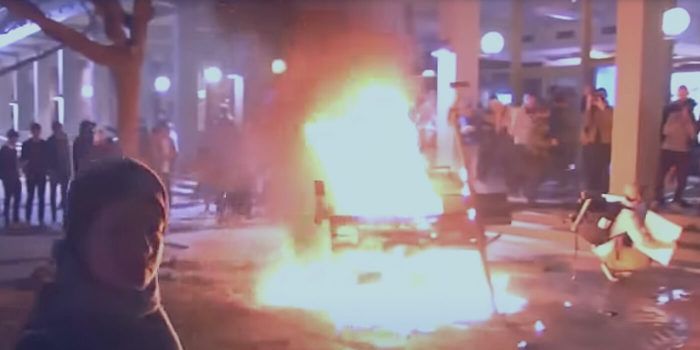(Karen Freeman, Headline USA) The Jewish dean of the law school at the University of California, Berkeley—considered to be one of the wokest college campuses in the nation—was the latest high-profile liberal to express shock over the growing wave of anti-Semitism on the radical Left.
In an op-ed Sunday for the Los Angeles Times, Erwin Chemerinsky—a constitutional law scholar who previously worked as an attorney in the Justice Department’s Civil Rights Division—voiced his dismay over the many student rallies celebrating Hamas’s Oct. 7 terrorist attack on Israel.
“I am a 70-year-old Jewish man, but never in my life have I seen or felt the antisemitism of the last few weeks,” the Chicago native began.
He noted there had been at least one personal attack on him after a member of the Berkeley community reportedly posted a photo on Instagram with the caption, “Erwin Chemerinsky has taken an indefinite sabbatical from Berkeley Law to join the I.D.F.,” referencing the Israeli army.
Celebrations of the Hamas attack and rallies protesting Israel’s retaliation sprang up all over the world—from college campuses to the streets of New York City, London and Paris. The student organization Students for Justice in Palestine proclaimed the massacre as an “historic win.”
College professors from such prestigious Ivy League universities as Yale and Columbia also celebrated the attack and condemned Israel striking back.
Chemerinsky said that while he understoond the initial hesitancy of campus administrators to speak out, it was no longer acceptable to remain silent.
“Students have the right to say very offensive and even hateful things, but school administrators—deans, presidents and chancellors—have free speech rights too,” he wrote. “They must exercise them and take a stand even if it will offend some and subject them to criticism.”
It remains to be seen whether the growing rift between liberal Jews and their anti-Semitic counterparts will impact Democrat party politics in the upcoming election cycle.
Chemerinsky, for one, made a point of sniping at conservative Israeli Prime Minister Benjamin Netanyahu, even while bemoaning the attacks on other Jews.
“Of course, criticism of the Israeli government is not antisemitism, any more than criticizing the policies of the United States government is anti-American,” he insisted.
“I strongly oppose the policies of the Netanyahu government, favor full rights for Palestinians, and believe that there must be a two-state solution,” he continued. “But if you listen to what is being said on college campuses now, some of the loudest voices are not advocating for a change in Israeli policies, but are calling for an end to Israel.”
His reticence notwithstanding, some proponents of intellectual freedom were hopeful that the shock of seeing how leftist rhetoric had radicalized students into Nazis might be the catalyst for much needed change in academia, where a dangerous degree of groupthink has taken root since the 1960s.
“Virtually every law school has courses of critical racial studies. Query how much of that curriculum focuses on anti-semitism?” wrote Josh Blackman, a Jewish constitutional law professor at the South Texas College of Law Houston and scholar at the Cato Institute, reacting to Chemerinsky’s op-ed in an essay for Reason magazine.
“Every law school has a DEI department. Query how much of that programming focuses on anti-semitism?” Blackman continued. “I suspect the answer to both questions is very little.”
Blackman said he witnessed the Left’s mob mentality firsthand in 2018 when attempting to give a speech for the Federalist Society at the City University of New York.
Despite having had grandparents who were Holocaust survivors, he was accused of being both a white supremacist and a Nazi because he had written dissenting legal opinions concerning the Obama administration’s controversial immigration and health-care policies.
“Those at the top of the oppression pyramid can dictate the terms of engagement for those at the bottom of the pyramid,” he said of the Left’s warped intersectional taxonomy.
“I was inserted somewhere in the middle of that pyramid, but still, my role was constrained,” he added. “Anti-semitism simply does not matter enough when other, more oppressed people, are being victimized.”
Even the White House has refused to specifically condemn pro-Hamas protestors as “extremists,” despite Jewish students being harassed and made to feel unsafe on college campuses.
Yet, conservatives on college campuses have long voiced their own alarm over the growing level of intolerance for ideological diversity. That often has entailed disruptive or even violent protests of visiting guest speakers, with the tacit approval—or, sometimes, overt participation—of faculty and administrators.
In 2017, hundreds protested and nine were arrested during a visit to Berkeley by Jewish conservative personality Ben Shapiro.
Chemerinsky, who had been appointed the law-school dean four months prior, wrote an ambivalent op-ed piece that struck a somewhat familiar refrain, calling on campus officials to condemn as “hate speech” the thing with which he happened to disagree at the time.
“Although speakers have a right to express hateful messages on campus, that does not mean that campus officials should silently tolerate such speech,” he wrote. “It is important that campus officials denounce hate when it occurs and explain why it is inconsistent with the type of community we desire.”
Headline USA’s Ben Sellers contributed to this report.

